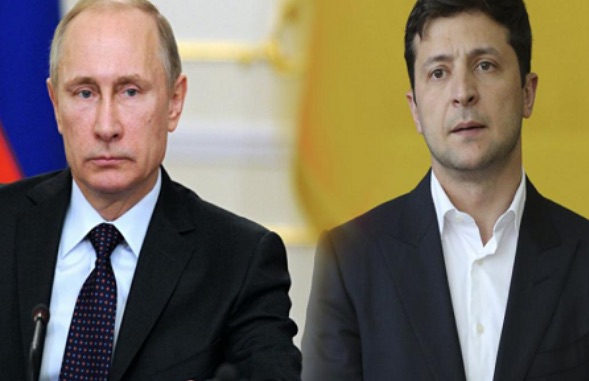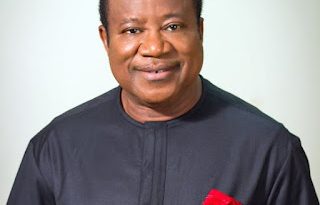Ukraine: Is Third World War Loading? – 1
By Bolanle Bolawole
turnpot@gmail.com 0705 263 1058
First, let us consider the cause or causes of the first two world wars that our world has witnessed. The immediate cause of World War I was the assassination of Archduke Franz Ferdinand of Austria-Hungary but historians are agreed that there are at least five remote causes of the war. World War I, known as the “war to end all wars,” occurred between July 1914 and November 11, 1918. By the end of the war, over 17 million people had been killed. According to Martin Kelly, “while the causes of the war are infinitely more complicated than a simple timeline of events, and are still debated and discussed to this day”, two of the most frequently-cited events that led to it were nationalism (what in Nigeria is called tribalism, ethnicity or, lately, self-determination struggle), and the imperatives of the mutual defence alliances of the time, just as we had the WARSAW Pact of the Soviet era and the North Atlantic Treaty Organization (NATO), which has waxed stronger, especially after the disintegration of the USSR on December 25, 1991.
Much of the origin of the 1st World War “was based on the desire of the Slavic peoples in Bosnia and Herzegovina to no longer be part of Austria-Hungary but instead be part of Serbia. This specific essentially nationalistic and ethnic revolt led directly to the assassination of Archduke Ferdinand, which was the event that tipped the scales to war. In June 1914, a Serbian-nationalist terrorist group called the Black Hand sent groups to assassinate the Archduke. Their first attempt failed when a driver avoided a grenade thrown at their car. However, later that day a Serbian nationalist named Gavrilo Princip shot the Archduke and his wife while they were driving through Sarajevo, Bosnia which was part of Austria-Hungary. They died of their wounds…The assassination of Ferdinand led to Austria-Hungary declaring war on Serbia. When Russia began to mobilize to defend its alliance with Serbia, Germany declared war on Russia. Thus began the expansion of the war to include all those involved in the mutual defence alliances”. From the rattle-sabre and rhetoric of war following the Russia/Ukraine tango, especially with alliance members filing up behind one another, it can be said that our world has learnt no lessons from its recent history! In the same way that Nigerian leaders continue to live in self-denial of its own national question! Will they leave this fire on the roof until it is too late?
Adds Kelly: Countries throughout the world have always made mutual defence agreements with their neighbours; treaties that could pull them into battle. These treaties meant that if one country was attacked, the allied countries were bound to defend them. Before World War 1 began, the following alliances existed: Russia and Serbia, Germany and Austria-Hungary, France and Russia, Britain and France and Belgium; and Japan and Britain. When Austria-Hungary declared war on Serbia, Russia got involved to defend Serbia. Germany, seeing that Russia was mobilizing, declared war on Russia. France was then drawn in against Germany and Austria-Hungary. Germany attacked France by marching through Belgium, pulling Britain into war. Then Japan entered the war to support its British allies. Later, Italy and the United States would enter on the side of the Allies (Britain, France, Russia, etc.)”
The war ended in 1918 with the entry of the US on the side of the Allied Powers (Great Britain, France, Russia, Italy, Romania, and Japan); Germany and its allies (Austria-Hungary, Bulgaria, and the Ottoman Empire, known as the Central Powers) were defeated and Germany was forced to sign an armistice agreement with the Allies on November 11, 1918. Many have described portions of the agreement as harsh and humiliating; especially Article 231 known as the “war guilt clause”, which forced Germany to accept complete responsibility for initiating World War 1. The Treaty of Versailles, signed after the war, demanded crushing financial restitution to the tune of 132 billion marks (about US $269 billion) from Germany. Versailles also created the League of Nations; the precursor of today’s the United Nations. Germany felt humiliated by the provisions of the treaty but must have comforted itself with the postulation of French philosopher, Jean-Jacques Rousseau, that “As long as a people is compelled to obey, and obeys, it does well; as soon as it can shake off the yoke, and shakes it off, it does better… the strongest is never strong enough to always be master, unless he transforms strength into right and obedience into duty” But how many of today’s strong men or nations take this to heart?
The immediate cause of the Second World War – the final straw that broke the camel’s back – was the invasion of Poland by Nazi Germany on September 1, 1939 and the subsequent declaration of war on Germany by Britain and France. Many other prior events leading to a war which killed an estimated 70-80 million people or about three per cent of the world population of about 2.3 billion at the time include Germany’s disaffection with the Treaty of Versailles (which they were never allowed to negotiate but were only presented with the stark reality of “sign or be invaded!”); the worldwide economic depression of the time; failure of the appeasement policy which the Allied Powers had initially extended to Adolf Hitler as he gobbled up one foreign territory after another, thinking he could be satiated; the rise of militarism in Germany and Japan; and the failure of the League of Nations to maintain world peace and security, which was its raison detre. According to Robert Wilde, the terms of Versailles caused anger, hate, and revulsion across the German society; hence the treaty was (rightly) described by the Germans as a “diktat” – a dictated peace and the German signatories to it were called the “November criminals”. A fertile ground for the emergence of Hitler and of German nationalism was thus prepared!
The League of Nations, formed in 1918, survived till the outbreak of the 2nd World War in 1939 – a period of 21 years – while the United Nations, formed in 1945, has survived till date, meaning a period of 77 years; that, however, is not to say that the world has known all-round peace on all fronts within the period. In the interval the world has witnessed many regional wars; and the Cold War fuelling a cut-throat arms race between the two superpowers of the US and its allies on one hand and the now defunct Union of Soviet Socialist Republic (USSR) and its allies on the other. Perhaps the nearest – and scariest – the world came close to a nuclear war between the two was the Cuban missile crisis of 1962.
According to HISTORY.COM EDITORS, “leaders of the U.S. and the Soviet Union engaged in a tense, 13-day political and military stand-off in October 1962 over the installation of nuclear-armed Soviet missiles on Cuba, just 90 miles from U.S. shores… In a TV address on October 22, 1962, President John F. Kennedy (1917-63) notified Americans about the presence of the missiles, explained his decision to enact a naval blockade around Cuba and made it clear the U.S. was prepared to use military force if necessary to neutralize this perceived threat to national security. Following this news, many people feared the world was on the brink of nuclear war. However, disaster was avoided when the U.S. agreed to Soviet leader Nikita Khrushchev’s (1894-1971) offer to remove the Cuban missiles in exchange for the U.S. promising not to invade Cuba. Kennedy also secretly agreed to remove U.S. missiles from Turkey.
“After seizing power in the Caribbean island nation of Cuba in 1959, leftist revolutionary leader Fidel Castro (1926-2016) aligned himself with the Soviet Union. Under Castro, Cuba grew dependent on the Soviets for military and economic aid. During this time, the U.S. and the Soviets (and their respective allies) were engaged in the Cold War (1945-91), an ongoing series of largely political and economic clashes. The two superpowers plunged into one of their biggest Cold War confrontations after the pilot of an American U-2 spy plane piloted by Major Richard Heyser making a high-altitude pass over Cuba on October 14, 1962, photographed a Soviet SS-4 medium-range ballistic missile being assembled for installation.
“President Kennedy was briefed about the situation on October 16… For nearly the next two weeks, the president and his team wrestled with a diplomatic crisis of epic proportions, as did their counterparts in the Soviet Union. For the American officials, the urgency of the situation stemmed from the fact that the nuclear-armed Cuban missiles were being installed so close to the U.S. mainland – just 90 miles south of Florida. From that launch point, they were capable of quickly reaching targets in the eastern U.S. If allowed to become operational, the missiles would fundamentally alter the complexion of the nuclear rivalry between the U.S. and the Union of Soviet Socialist Republics (USSR), which up to that point had been dominated by the Americans.
“Soviet leader Nikita Khrushchev had gambled on sending the missiles to Cuba with the specific goal of increasing his nation’s nuclear strike capability. The Soviets had long felt uneasy about the number of nuclear weapons that were targeted at them from sites in Western Europe and Turkey, and they saw the deployment of missiles in Cuba as a way to level the playing field. Another key factor in the Soviet missile scheme was the hostile relationship between the U.S. and Cuba. The Kennedy administration had already launched one attack on the island – the failed Bay of Pigs invasion in 1961 – and Castro and Khrushchev saw the missiles as a means of deterring further U.S. aggression.
“From the outset of the crisis, Kennedy…determined that the presence of Soviet missiles in Cuba was unacceptable. The challenge…was (how) to orchestrate their removal without initiating a wider conflict – and possibly a nuclear war. In deliberations that stretched on for nearly a week, they came up with a variety of options, including a bombing attack on the missile sites and a full-scale invasion of Cuba. But Kennedy ultimately decided on a more measured approach. First, he would employ the U.S. Navy to establish a blockade, or quarantine, of the island to prevent the Soviets from delivering additional missiles and military equipment. Second, he would deliver an ultimatum that the existing missiles be removed…
“A crucial moment in the unfolding crisis arrived on October 24 when Soviet ships bound for Cuba neared the line of U.S. vessels enforcing the blockade. An attempt by the Soviets to breach the blockade would likely have sparked a military confrontation that could have quickly escalated to a nuclear exchange. But the Soviet ships stopped short of the blockade… The tense standoff between the superpowers continued through the week, and on October 27, an American reconnaissance plane was shot down over Cuba, and a U.S. invasion force was readied in Florida… Despite the enormous tension, Soviet and American leaders found a way out of the impasse. During the crisis, the Americans and Soviets had exchanged letters and other communications, and on October 26, Khrushchev sent a message to Kennedy in which he offered to remove the Cuban missiles in exchange for a promise by U.S. leaders not to invade Cuba. The following day, the Soviet leader sent a letter proposing that the USSR would dismantle its missiles in Cuba if the Americans removed their missile installations in Turkey.
“Officially, the Kennedy administration decided to accept the terms of the first message and ignore the second Khrushchev letter entirely. Privately, however, American officials also agreed to withdraw their nation’s missiles from Turkey… and on October 28, the crisis drew to a close. Both the Americans and Soviets were sobered by the Cuban missile crisis. The following year, a direct “hot line” communication link was installed between Washington and Moscow to help defuse similar situations, and the superpowers signed two treaties related to nuclear weapons”
Why hasn’t similar commonsense and stellar statesmanship, rather than brinkmanship and war mongering, prevailed in the Russia/Ukraine crisis? TO BE CONTINUED.
Former editor of The PUNCH newspapers and Chairman of its Editorial Board, BOLAWOLE writes the TREASURES column in the New Telegraph newspaper and the ON THE LORD’S DAY column in the Sunday Tribune newspaper. He is also a public affairs analyst on radio and television.




